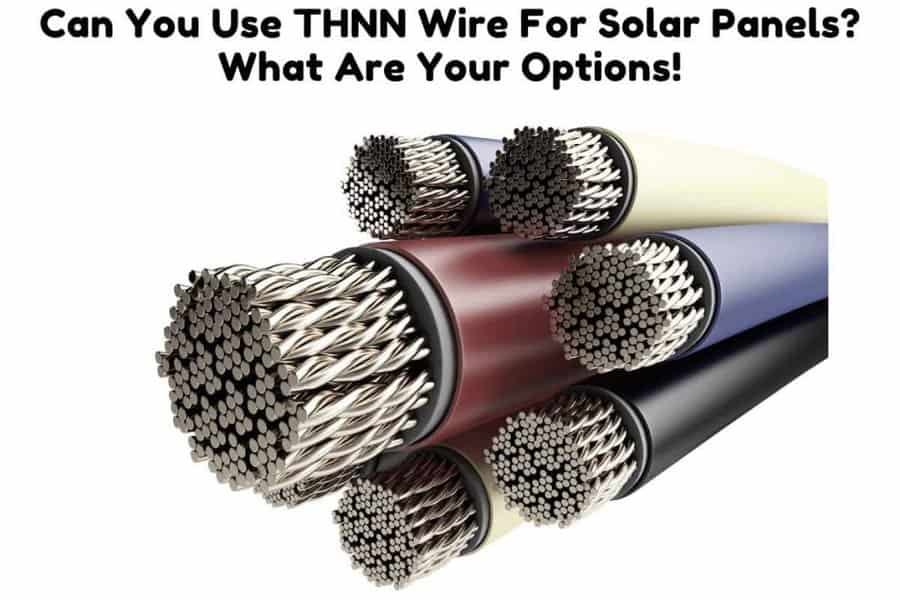THNN (Thermoplastic High Heat-resistant Nylon-coated) wire can be used for specific applications in a solar system. THNN and THWN (Thermoplastic Heat and Water Resistant) wire is building wire that is used for construction, circuits, and appliances. It is also a simple option for solar applications.
But what does THNN or THWN mean and where do they fit into a solar system? In this guide, we introduce a few basic concepts about the types of wires that are used for solar panels. We explore when you should use them and what alternatives you can use.

What Type Of Wire Is Used For Solar Panels?
Solar panels are wired using either USE-2 or PV wire. A solar system will also use one of either THNN or THWN wire. These are wires, or conductors as they are more accurately called, used to move electricity from a solar panel to other system components like batteries or inverters. The wires vary in thickness and insulation depending on where they will be used in the system.
Knowing where the types of wire used in a solar system fit help avoid making costly mistakes in the design. Where do USE-2 or PV wire fit in and what is the difference between them?
On a side note! If you’re in need of a reliable and high-performance portable solar panel, We strongly recommend the Jackery SolarSaga 100W Portable Solar Panel (Amazon Link).
With a high conversion efficiency and foldable design, this solar panel is easy to transport and set up, making it perfect for outdoor activities like camping, hiking, and RV trips.

The US solar cell technology used in this panel ensures that you get the most efficient and reliable solar charging possible.
There is also a 60W option that is more affordable (Amazon Link)
To make a simple explanation of what each wire does we will split the wires into two categories, namely outdoor wiring, and indoor wiring.
Outdoor wiring
Outdoor wiring is the conductors used outside the building. Outdoor wiring is used to connect solar panels as an array. They are also used to connect a solar panel to a microinverter if there is one.
The distinctive quality of outdoor wiring is that it has to be weather resistant since the wires will be exposed to the elements. The wire has to be heat, cold, dust, moisture, and light resistant. This is why outdoor wiring is thicker and more heavily insulated than indoor wiring.
There are two types of outdoor wiring used for solar panels. These are USE-2 and PV wire. Also check out if you Can You Use AC Cable For Solar Panels? What Are Your Options !
USE-2
USE-2 also known as RHW/RHH wire is a general-purpose wire that is used for solar panels. USE-2 is rated up to 600V with a temperature rating of 90 degrees Celsius for wet and dry conditions. USE-2 has been in use for much longer than PV wire which was introduced in 2008.
PV wire
PV wire is wire rated UL 4703. It’s a superior alternative to USE-2. It has a few distinct advantages in that it has a higher voltage rating of up to 2000V and improved heat tolerance of up to 150 degrees Celsius.
It’s also more flexible than most USE-2 wire types as it uses stranded wire while the latter typically uses solid wire. It can also be used for both grounded and ungrounded arrays whereas USE-2 can only be used for grounded arrays.
PV wire is, however, more expensive than USE-2.
PV or USE-2 can be used in place of each other as the outdoor wiring for solar panels. The last or end point of outdoor wiring is the junction box. Source
Indoor wiring
From outdoor wiring, we transition to indoor or building wiring at the junction box. Building wiring connects the solar panels to the charge controller if there is a battery in the system or directly to the inverter if there is no battery.
Indoor wiring is different from outdoor wiring and they cannot be used in place of each other because of their respective properties. Indoor wiring is not as weather resistant while outdoor wiring is not as a fire retardant.
Building wiring is typically either heat resistant thermoplastic (THHN) or moisture and heat resistant thermoplastic (THWN-2).
THNN and THWN-2 wires are general-purpose building wires that are used for solar applications. They can be used in place of the other. The difference between them is that THWN-2 is more water resistant.
| WIRE | CONNECTS | VOLTAGE (V) | TEMPERATURE °C |
| PV wire | Outdoor solar panels | 600, 1000, 2000 | 90 wet, 150 dry |
| USE-2 | Outdoor solar panels | 600 | 90 wet and dry |
| THNN | Indoor components | 600 | 75 wet, 90 dry |
| THWN | Indoor components | 600 | 90 wet and dry |
Can I Use Regular Wire For Solar Panels?
A regular wire is unsuitable for solar panels. This is mainly because of the conditions to which the wires are exposed. Wires used for solar have to be weather resistant to handle temperature, moisture, and light degradation.
Solar panels have a lifespan of over 25 years. During that time, they are exposed to extreme heat, sunlight, and rain or hail. Just as the solar panels will be exposed to those elements, so too will the wiring.
The outdoor wiring used in solar panels can withstand heat, cold, and moisture because it is insulated with Cross-linked Polyethylene (XLP). It is also especially resistant to sunlight which can break down the insulation and leave wires exposed. Source
Building wire is flame, moisture, and heat resistant. Using any other wire that does not have these characteristics can create a safety hazard and can work out to be more expensive as it’s likely to need replacing sooner.
There is also the issue of building codes and permitting. The National Electrical Code specifically prohibits using just any wiring for solar applications. You run the risk of your system not passing inspections and being approved if you do not use the correct wiring.
Is PV Wire THWN?
THWN wire is building wire that is used to interconnect solar components. PV wire is wire rated UL 4703 and is used for interconnecting solar panels. THWN wire is not typically used for connecting solar panels and PV wire cannot be used as building wire. While they are both used for solar, they have different applications.
THWN wire is used indoors whereas PV wire is more suited for outdoor use. The latter is thicker and more weather resistant. You also cannot bury THWN wire unlike with PV wire.
Can You Use THHN Wire For DC Power?
THHN wire can be used as a conductor for DC power. No wire is strictly AC or DC. A wire can be used in either application although there might be a drop in efficiency.

